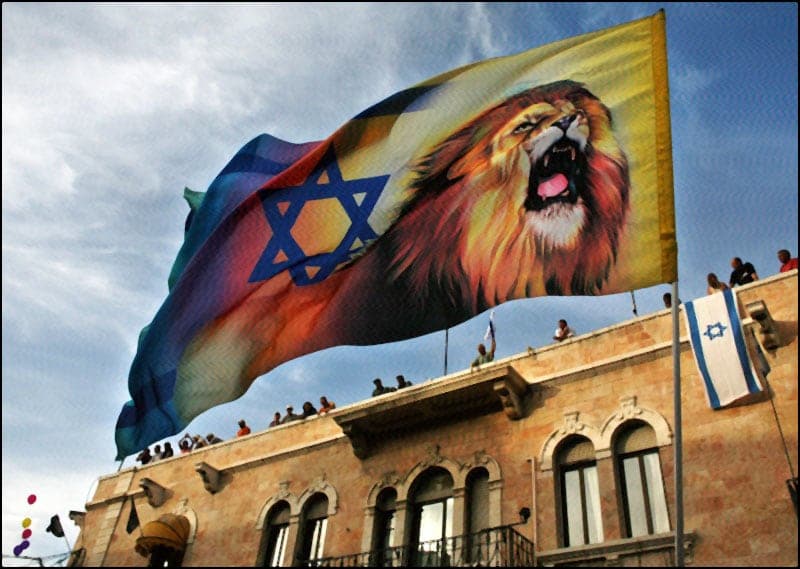Navigation
Install the app
How to install the app on iOS
Follow along with the video below to see how to install our site as a web app on your home screen.
Note: This feature may not be available in some browsers.
More options
You are using an out of date browser. It may not display this or other websites correctly.
You should upgrade or use an alternative browser.
You should upgrade or use an alternative browser.
Who are the Israelis?
- Thread starter P F Tinmore
- Start date
rylah
Gold Member
- Jun 10, 2015
- 21,751
- 4,665
Black Jews: Their Place in History. A Conversation with Nissim Black and Henry Abramson
A conversation with Nissim Black and Henry Abramson, moderated by Mordechai Yosef ben Avraham. The panelists and moderator will explore the idea of race and color in Jewish history and culture, and discuss the African and African-American Jewish experience over the centuries and in contemporary America, Europe and Israel. Recognizing that the world is at a potential inflection point on issues of race, the participants hope to expose the audience to the broader perspective that comes from understanding the experience of Black Jews, both in their shared historical past as part of the Jewish people and in their future history as well.rylah
Gold Member
- Jun 10, 2015
- 21,751
- 4,665
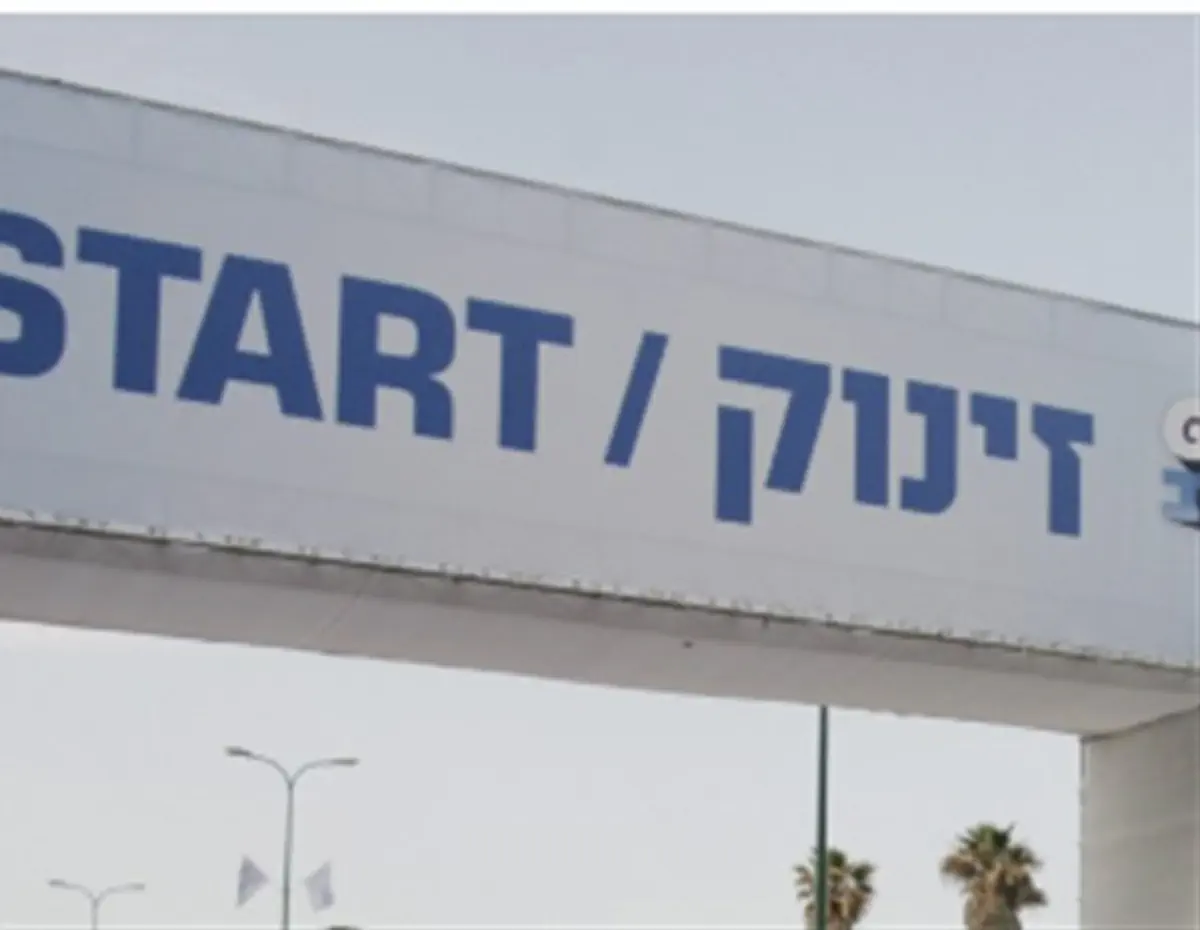
Haredi marathon runner Beatie Deutsch is the face of new Adidas campaign
“I’m using this gift that Hashem has given me in a way to fulfill my mission here. I’m really blessed.”
rylah
Gold Member
- Jun 10, 2015
- 21,751
- 4,665
First time in his life - Rabbi Bar-Hen, the Rabbi of Barcelona ascended the Temple Mount
The Rabbi of Barcelona, Rabbi Meir Bar-Hen, ascended the Temple Mount for the first time today (Thursday), together with the ascent of the rabbis of the Ma'arav Sages who ascended the Temple Mount today.
With Rabbi Ben Bar-Hen, Rabbi Yehuda Shloush, Rabbi Rafael Daloyah, Rabbi Shmuel Moreno, Rabbi David Lankri, Rabbi Ron Alon and Rabbi Meir Sadeh in Jerusalem.
Assaf Fried, director of the Temple Mount, said that the rabbis gave Torah lessons there. “Every Rabbi’s ascent to the Temple Mount is an exciting progression,” he said. "And certainly of another rabbi who joins the increasing ranks of those young who ascend , seeking the Temple on the Temple Mount."
Over the past month, rabbis and heads of Yeshivas have ascended the Temple Mount, giving their first full Torah lessons on the Temple Mount. Among them are the judges (Dayanim) and heads of the Yeshivas who ascended the mountain: Rabbi Benyahu Brunner, Rabbi Israel Ariel, Rabbi Hayim 'Ozer Hayyat, Rabbi Noam Perl, Rabbi Eyal Ya'akubovich, Rabbi Jeffrey Wolf, Rabbi Menahem Makover, Rabbi Michay Yosefi, Rabbi Yosef Palay Rabbi No'am Waldman, and Rabbi Hevron Shiloh.

Israel National News - Hebrew
The Rabbi of Barcelona, Rabbi Meir Bar-Hen, ascended the Temple Mount for the first time today (Thursday), together with the ascent of the rabbis of the Ma'arav Sages who ascended the Temple Mount today.
With Rabbi Ben Bar-Hen, Rabbi Yehuda Shloush, Rabbi Rafael Daloyah, Rabbi Shmuel Moreno, Rabbi David Lankri, Rabbi Ron Alon and Rabbi Meir Sadeh in Jerusalem.
Assaf Fried, director of the Temple Mount, said that the rabbis gave Torah lessons there. “Every Rabbi’s ascent to the Temple Mount is an exciting progression,” he said. "And certainly of another rabbi who joins the increasing ranks of those young who ascend , seeking the Temple on the Temple Mount."
Over the past month, rabbis and heads of Yeshivas have ascended the Temple Mount, giving their first full Torah lessons on the Temple Mount. Among them are the judges (Dayanim) and heads of the Yeshivas who ascended the mountain: Rabbi Benyahu Brunner, Rabbi Israel Ariel, Rabbi Hayim 'Ozer Hayyat, Rabbi Noam Perl, Rabbi Eyal Ya'akubovich, Rabbi Jeffrey Wolf, Rabbi Menahem Makover, Rabbi Michay Yosefi, Rabbi Yosef Palay Rabbi No'am Waldman, and Rabbi Hevron Shiloh.

Israel National News - Hebrew
Last edited:
rylah
Gold Member
- Jun 10, 2015
- 21,751
- 4,665
HaRav Avraham HaKohen Kook Ztz"l - The founder of the Chief Rabbinate
With his appointment as Chief Rabbi of Jerusalem, and subsequently of all of British controlled Palestine, Rav Avraham Yitzchok Hakohen Kook (1875-1935) transitioned into his most active period in the public sphere. While garnering much support and staving off the opposition, he managed to build and accomplish in many areas of Jewish life. Along with other Rabbis, he became a primary architect of the Rabbanut to regulate religious life in the "Yishuv", he invested much in Yeshivas and Jewish education, developed working -albeit often times strained- relationships with officials in the British Government, and managed to build bridges with the secular Zionist leadership as well.
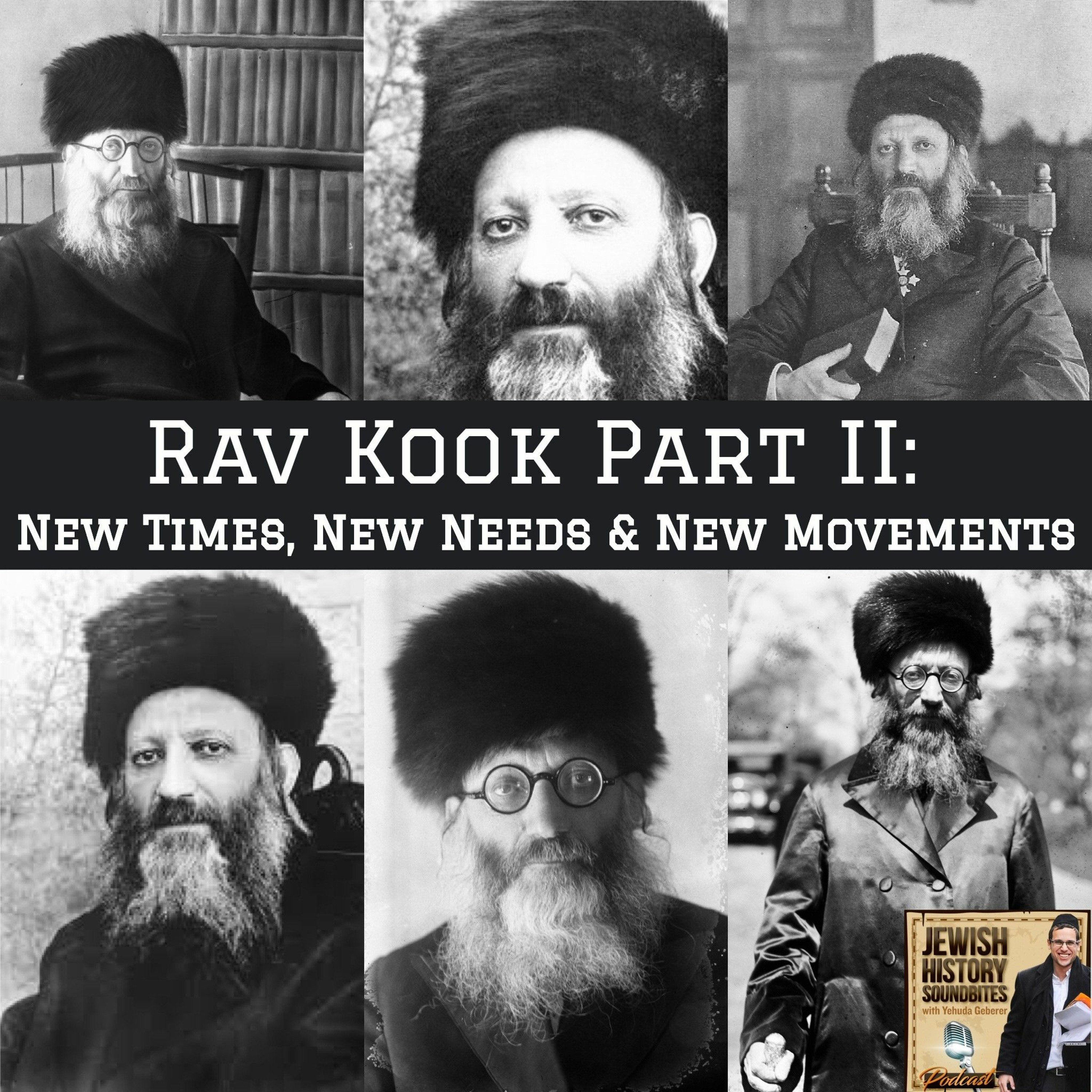
Rav Kook Part II: New Times, New Needs & New Movements - Jewish History Soundbites
which the world has yet to know.
Even during his times there were but a handful of Torah geniuses, who but remotely understood what he was writing about. Today the generation first opens his books
in their early 20's - to find what we 'always knew but couldn't express'...
With his appointment as Chief Rabbi of Jerusalem, and subsequently of all of British controlled Palestine, Rav Avraham Yitzchok Hakohen Kook (1875-1935) transitioned into his most active period in the public sphere. While garnering much support and staving off the opposition, he managed to build and accomplish in many areas of Jewish life. Along with other Rabbis, he became a primary architect of the Rabbanut to regulate religious life in the "Yishuv", he invested much in Yeshivas and Jewish education, developed working -albeit often times strained- relationships with officials in the British Government, and managed to build bridges with the secular Zionist leadership as well.

Rav Kook Part II: New Times, New Needs & New Movements - Jewish History Soundbites
(Comment)
The most influential thinker for our generationwhich the world has yet to know.
Even during his times there were but a handful of Torah geniuses, who but remotely understood what he was writing about. Today the generation first opens his books
in their early 20's - to find what we 'always knew but couldn't express'...
Last edited:
rylah
Gold Member
- Jun 10, 2015
- 21,751
- 4,665
Shahar Admoni - Ten Li Menuhah ('Eden Meiri Cover)
Every minute passes like a year
I don't forget Who is there by my side
Another 2,000 run, miles I've crossed alone
And on the way, what will be on the way
Clouds are above us, maybe You've sent rain to wash my mistakes
Give me serenity what is that for You
To have a victory there for me
Teach me to sometimes also
Ask for a bit forgiveness from myself
Come to me visit in the evening
Enter saying without words
That I am only one
Also one in a thousand
People who do mistakes
Every minute passes like a year
I don't forget Who is there by my side
Another 2,000 run, miles I've crossed alone
And on the way, what will be on the way
Clouds are above us, maybe You've sent rain to wash my mistakes
Give me serenity what is that for You
To have a victory there for me
Teach me to sometimes also
Ask for a bit forgiveness from myself
Come to me visit in the evening
Enter saying without words
That I am only one
Also one in a thousand
People who do mistakes
rylah
Gold Member
- Jun 10, 2015
- 21,751
- 4,665
Amir Dadon - Ben Adam (Human)
What are You running from
What are You running from, G-d from what?
Digging the wound only to feel
Where are You running to
Where are You running to, G-d where to?
Nights cheap are costly sometimes
Ben Adam!
Comes to visit disappears
Chasing love chasing songs
I have never given up, only scattered from within
What are You running from
What are You running from, G-d from what?
Digging the wound only to feel
Where are You running to
Where are You running to, G-d where to?
Nights cheap are costly sometimes
Ben Adam!
Comes to visit disappears
Chasing love chasing songs
I have never given up, only scattered from within
Last edited:
rylah
Gold Member
- Jun 10, 2015
- 21,751
- 4,665
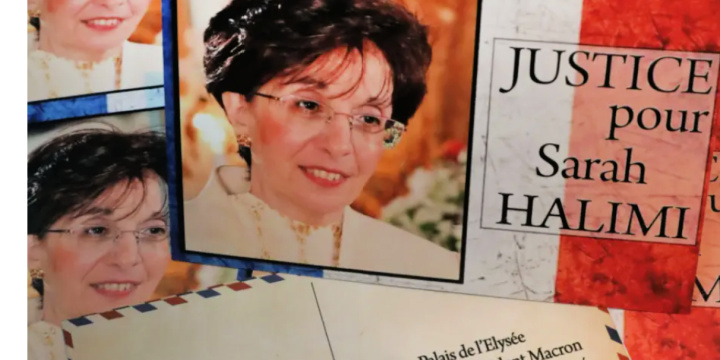
Report: Family of Sarah Halimi, Murdered in France, Files Complaint in Israel Against Killer
A postcard campaign calling for justice for Sarah Halimi addressed to French President Emmanuel Macron. Photo: courtesy of Israelite Consistoire …
 www.algemeiner.com
www.algemeiner.com

Report: Family of Sarah Halimi, Murdered in France, Files Complaint in Israel Against Killer
A postcard campaign calling for justice for Sarah Halimi addressed to French President Emmanuel Macron. Photo: courtesy of Israelite Consistoire …
(COMMENT)
Sarah Halimi's Hy"d horrific death
may be the turning point in Israeli judicial reform.
Despite this only partially expressing the growing concern, especially among those who initially knew not to wait for any serious attention from the French authorities,
hoping for a more symbolically clear and direct Israeli response.
Reminder: the French excused Halimi's murderer - for smoking a joint,
as he beat her to death and threw her body from the window shouting "Allahu Akhbar!".

Last edited:
rylah
Gold Member
- Jun 10, 2015
- 21,751
- 4,665
Weekly Torah Portion - 'Judges' (Shoftim 5781) -
Collective & Individual Teshuvah | The Wisdom of Hebrew Court

"You shall appoint magistrates and officials for your tribes, in all the settlements that the LORD your God is giving you, and they shall govern the people with due justice" - Devarim 16 18
According to Rav Kook, Teshuva is returning to our true selves,
individually and collectively as a nation, and thus to God.
In Orot HaTehiya – Lights of Revival 9, Rav Kook says, “An individual can sever himself from the source of life, but not so, the entire Jewish nation. The national assets, which are beloved to the nation….are all invested with the spirit of God: her land, language, history, and customs…the spirit of the Lord and the [national] spirit of Israel are one.”
During these early days of Elul, we find the intersection of Teshuva, Rav Kook, his redemptive vision, and the ideal national structure of the Jewish people in their homeland, the Land of Israel, described in this week’s Torah reading, Parshat Shoftim. We find both Teshuvat HaPrat (individual teshuva) and Teshuvat HaKlal (national teshuva, i.e. the return of the Nation of Israel to its land, and to its soulful essence).
The Torah shows the Jewish People, the institutions needed, to build a holy society in Eretz Yisrael (the Land of Israel), that will then become a shining example for the nations, on how to express Tzidkut (righteousness) on the national level.
“Tzedek, Tzedek Tirdof…Justice and Righteousness shall you pursue, so that you may live and possess the land the Lord your God is giving you,” (Deuteronomy 16:20).
In Shoftim, we encounter the Mitzvot to appoint a king, and the laws of war (Deut. 17:14-20, 20:1-20); to establish a Torah-based Legal System (Deut. 16:18) and recognize G-d’s prophets (Deut. 18:15); and issues dealing with the Priests and Levites (Deut. 18:1).
Parshat Shoftim describes policies that Jews should be striving to implement today: Malchut/Kingdom, Sanhedrin/Torah, Nevuah/Prophecy, and Kehunah/Holy Temple. It provides the blueprint to building the Tzadik State of Israel, in the time of Redemption.
What is a Tzadik State?
Just like the Torah sets out the structure, of how an individual Jew can best relate to his Creator (through the Mitzvot), and express his/or her personal example of Kedushah (holiness) in the world, it also does it for the Jewish People on the national level. This national structure sets up the framework for individual Jews and the nation as a whole, to reach their full potential. The purpose of their “chosenness.”
“You shall be for Me a kingdom of priests [teachers] and a holy nation,” (Exodus 19:6).
In our generation, HaShem (the God of Israel), is redeeming the Jewish people before our eyes. Besides prayers, longings and individual teshuva, it’s possible to do actual physical acts, for example making Aliyah (move to Israel), settling and building up the Land, serving in the army, etc., all aspects of national teshuva.
And, what can be done, like working to re-establish the Sanhedrin, and preparing all the materials, to rebuild the Beit Hamikdash (Holy Temple), should be done.
Rav Kook wrote presciently, one hundred years ago, “The world order that is now toppling, due to the awesome storms of a sword covered with blood, demands the re-construction of the Jewish nation [in its land].”
“The building of the nation and the discovery of its spirit are one concept, linked to the building of the world, which is disintegrating and longing for a force filled with unity and loftiness…the spirit of God pervades her [Israel]…The voice of God calls loudly, and from the interior of our soul and life’s movements we distinguish it.”
“Israel must uncover the source of its life, to stand apprise of its spiritual character…World civilization totters, man’s spirit weakens, darkness covers all the peoples…But the hour has arrived, the light of the world, the light of the true God, the light of the God of Israel, revealed by his people…must be revealed in consciousness, and the consciousness must be internalized within the nation, to recognize the unity of her talents….When she will recognize that there is a God within her, she will understand how to tap the wellspring of her life, and how to orient her redemptive vision to her essential source.”
“All the world’s civilizations will be renewed through the renewal of our spirit…The blessing of Abraham to all the nations of the earth will commence…with our rebuilding in the Land of Israel. The present destruction, is the preparation of a profound renascence [of Israel and the world].” (Orot MeOfel – Lights from Darkness, 9).
 www.jewishpress.com
www.jewishpress.com
Collective & Individual Teshuvah | The Wisdom of Hebrew Court

"You shall appoint magistrates and officials for your tribes, in all the settlements that the LORD your God is giving you, and they shall govern the people with due justice" - Devarim 16 18
According to Rav Kook, Teshuva is returning to our true selves,
individually and collectively as a nation, and thus to God.
In Orot HaTehiya – Lights of Revival 9, Rav Kook says, “An individual can sever himself from the source of life, but not so, the entire Jewish nation. The national assets, which are beloved to the nation….are all invested with the spirit of God: her land, language, history, and customs…the spirit of the Lord and the [national] spirit of Israel are one.”
During these early days of Elul, we find the intersection of Teshuva, Rav Kook, his redemptive vision, and the ideal national structure of the Jewish people in their homeland, the Land of Israel, described in this week’s Torah reading, Parshat Shoftim. We find both Teshuvat HaPrat (individual teshuva) and Teshuvat HaKlal (national teshuva, i.e. the return of the Nation of Israel to its land, and to its soulful essence).
The Torah shows the Jewish People, the institutions needed, to build a holy society in Eretz Yisrael (the Land of Israel), that will then become a shining example for the nations, on how to express Tzidkut (righteousness) on the national level.
“Tzedek, Tzedek Tirdof…Justice and Righteousness shall you pursue, so that you may live and possess the land the Lord your God is giving you,” (Deuteronomy 16:20).
In Shoftim, we encounter the Mitzvot to appoint a king, and the laws of war (Deut. 17:14-20, 20:1-20); to establish a Torah-based Legal System (Deut. 16:18) and recognize G-d’s prophets (Deut. 18:15); and issues dealing with the Priests and Levites (Deut. 18:1).
Parshat Shoftim describes policies that Jews should be striving to implement today: Malchut/Kingdom, Sanhedrin/Torah, Nevuah/Prophecy, and Kehunah/Holy Temple. It provides the blueprint to building the Tzadik State of Israel, in the time of Redemption.
What is a Tzadik State?
Just like the Torah sets out the structure, of how an individual Jew can best relate to his Creator (through the Mitzvot), and express his/or her personal example of Kedushah (holiness) in the world, it also does it for the Jewish People on the national level. This national structure sets up the framework for individual Jews and the nation as a whole, to reach their full potential. The purpose of their “chosenness.”
“You shall be for Me a kingdom of priests [teachers] and a holy nation,” (Exodus 19:6).
In our generation, HaShem (the God of Israel), is redeeming the Jewish people before our eyes. Besides prayers, longings and individual teshuva, it’s possible to do actual physical acts, for example making Aliyah (move to Israel), settling and building up the Land, serving in the army, etc., all aspects of national teshuva.
And, what can be done, like working to re-establish the Sanhedrin, and preparing all the materials, to rebuild the Beit Hamikdash (Holy Temple), should be done.
Rav Kook wrote presciently, one hundred years ago, “The world order that is now toppling, due to the awesome storms of a sword covered with blood, demands the re-construction of the Jewish nation [in its land].”
“The building of the nation and the discovery of its spirit are one concept, linked to the building of the world, which is disintegrating and longing for a force filled with unity and loftiness…the spirit of God pervades her [Israel]…The voice of God calls loudly, and from the interior of our soul and life’s movements we distinguish it.”
“Israel must uncover the source of its life, to stand apprise of its spiritual character…World civilization totters, man’s spirit weakens, darkness covers all the peoples…But the hour has arrived, the light of the world, the light of the true God, the light of the God of Israel, revealed by his people…must be revealed in consciousness, and the consciousness must be internalized within the nation, to recognize the unity of her talents….When she will recognize that there is a God within her, she will understand how to tap the wellspring of her life, and how to orient her redemptive vision to her essential source.”
“All the world’s civilizations will be renewed through the renewal of our spirit…The blessing of Abraham to all the nations of the earth will commence…with our rebuilding in the Land of Israel. The present destruction, is the preparation of a profound renascence [of Israel and the world].” (Orot MeOfel – Lights from Darkness, 9).
Rav Kook, Teshuvat HaPrat, Teshuvat HaKlal and Shoftim
“Teshuva comes from the longing of the entire universe to become better and more pure, stronger and more elevated than its current state."
 www.jewishpress.com
www.jewishpress.com
Last edited:
rylah
Gold Member
- Jun 10, 2015
- 21,751
- 4,665
Girl finds 1,500-year-old coin at Talmud-era Jewish village in northern Israel
“This is an ancient bronze coin that, according to initial estimates, dates to the Talmudic period between the 4th and fifth centuries CE,” said the archaeological park manager, Dekel Segev. “This was the peak period of the Jewish village in Korazim.”Segev praised the girl for immediately handing over the coin to the park authorities.
“The girl and her family showed good citizenship and handed us the coin since it is a national treasure,” he said. “The coin will be passed on to the Israel Antiquities Authority for further research and preservation.”
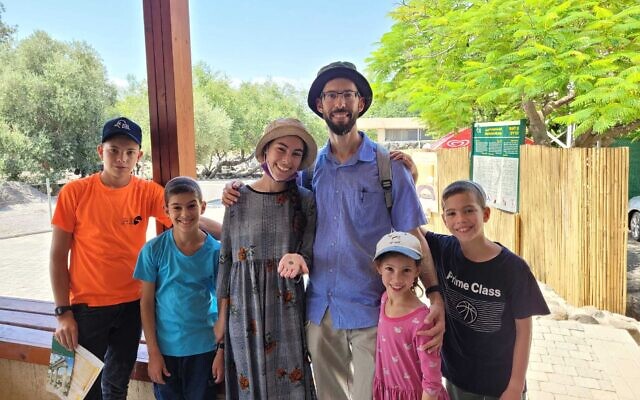

Girl finds 1,500-year-old coin at Talmud-era Jewish village in northern Israel
Young girl picks up the ancient bronze coin during a scavenger hunt game at ancient community of Korazim, hands it to park officials
They were neither European nor colonists. They were forced into Europe by the Romans, Arabs and Turks. They were simply returning home.And, they were almost all European colonists, as stated:
"During the Nineteenth century large suburbs to the north and east have grown up, chiefly for the use of the Jewish colony. These suburbs contain nearly Half the present population..."
And, we have the actual numbers for all of Palestine in 1921 through a more accurate British census where we see that there were more Christians than Jews.
"There are now in the whole of Palestine hardly 700,000 people, a population much less than that of the province of Gallilee alone in the time of Christ.* (*See Sir George Adam Smith "Historical Geography of the Holy Land", Chap. 20.) Of these 235,000 live in the larger towns, 465,000 in the smaller towns and villages. Four-fifths of the whole population are Moslems. A small proportion of these are Bedouin Arabs; the remainder, although they speak Arabic and are termed Arabs, are largely of mixed race. Some 77,000 of the population are Christians, in large majority belonging to the Orthodox Church, and speaking Arabic. The minority are members of the Latin or of the Uniate Greek Catholic Church, or--a small number--are Protestants.
The Jewish element of the population numbers 76,000. Almost all have entered Palestine during the last 40 years. Prior to 1850 there were in the country only a handful of Jews. - See more at: Mandate for Palestine - Interim report of the Mandatory to the League of Nations Balfour Declaration text 30 July 1921
I wonder if historians have attempted to tally the numbers of Jews and Christians exterminated by Muslims in that territory over the centuries.
Wrong. There were many Jews in that territory. The Jews living there helped the Zionist armies in the war of independence to find routes into Jerusalem.Any people whose ancestors were Jews in the area of Palestine 4,000 years ago had converted to Christianity (under Byzantine law) and then Islam (most of the current Muslim and Christian Palestinians) or had left.
"...or had left." Meaning, had been forcibly ethnically cleansed by Romans, Arabs and Turks.
rylah
Gold Member
- Jun 10, 2015
- 21,751
- 4,665
This morning: Brit milah for son of couple who lost first baby in terror attack
Brit milah ceremony for son of Shira and Amichai Ish-Ran will take place Monday morning at 10:15 a.m., after couple lost their first baby in terror attack.
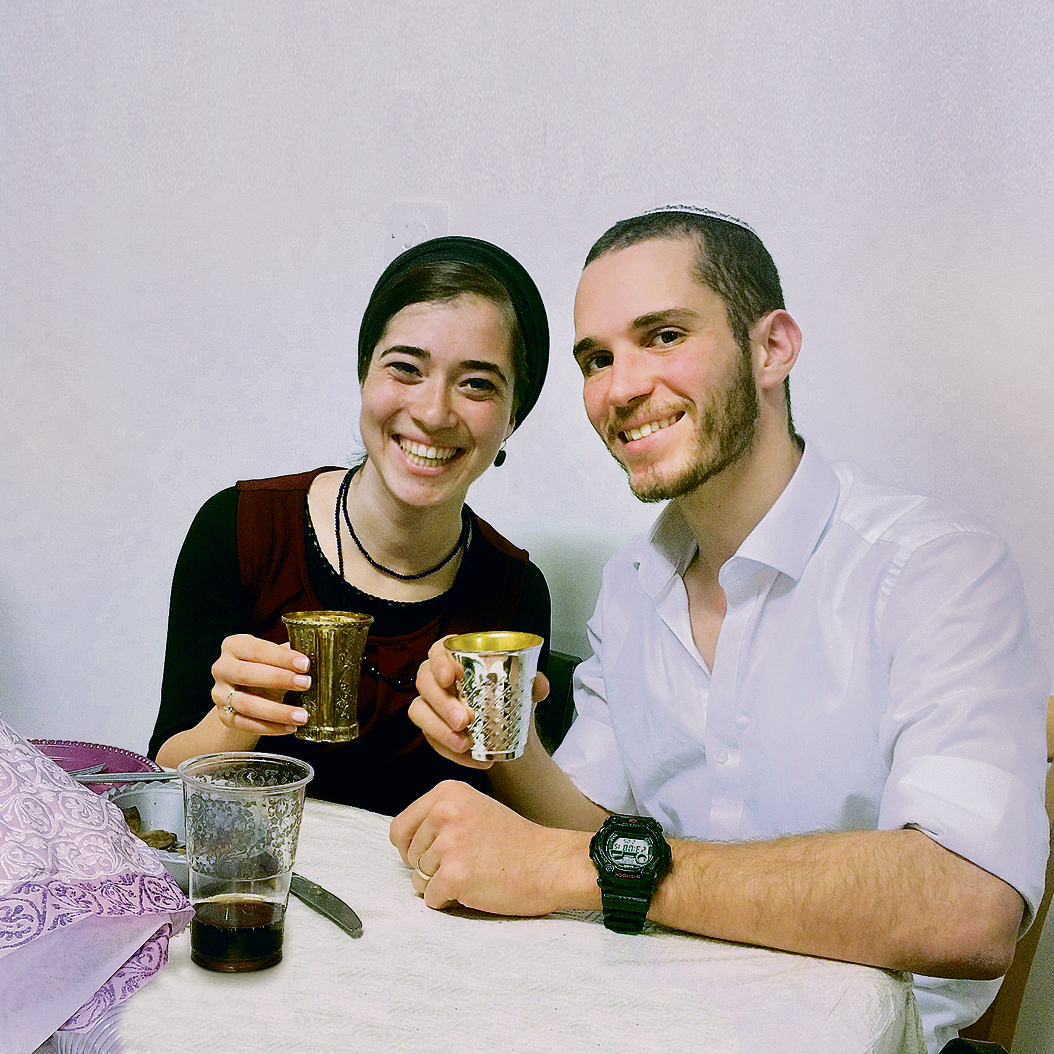
In the 2018 attack, Shira was shot by the terrorist and had to undergo a caesarean section, even though she was just seven months pregnant. The baby did not survive and three days later he was pronounced dead. The baby was laid to rest on the Mount of Olives after he was given the name Amiad Yisrael.
After the attack, the entire people of Israel prayed for the recovery of Shira and Amichai and also for the healing of the baby who later died at the hospital.About two weeks after the attack, the couple were released from Shaare Zedek Hospital and said, "It is so much fun to be part of such a people, who send letters, messages, visit all the time until you have to ask them to stop, send flowers, food for Shabbat, sweets, just amazing, it's all about the Jewish nation."
Amichai said that “our baby managed to do in the short three days that he lived more than we all managed ... he just united us ... everyone came and wanted to participate and strengthen, everyone felt connected. I am proud to be a part of such a nation.”
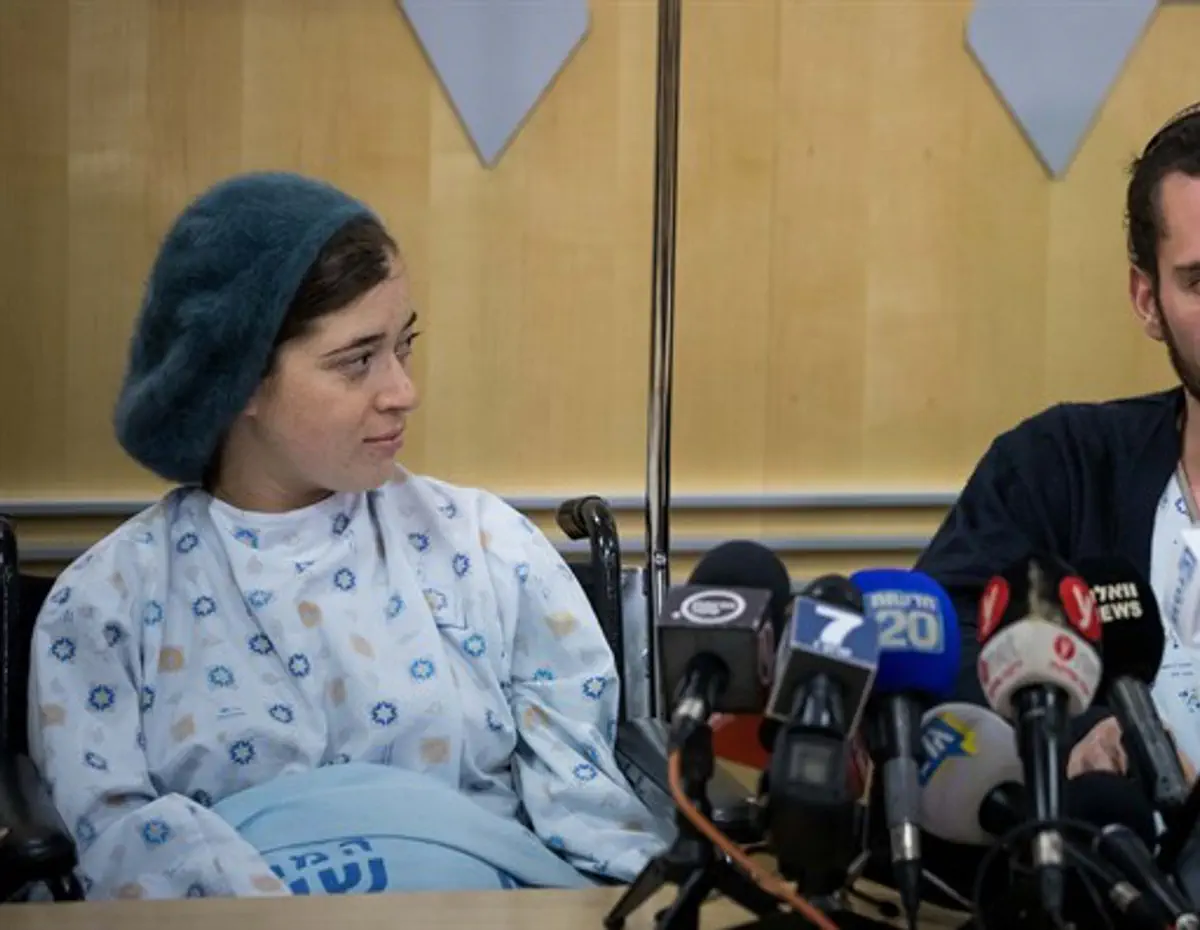
This morning: Brit for son of couple who lost baby in terror attack
Brit milah ceremony for son of Shira and Amichai Ish-Ran will take place Monday morning at 10:15 a.m., nearly three years after couple lost their first baby in terror attack.
Last edited:
Similar threads
- Replies
- 6
- Views
- 188
- Replies
- 4
- Views
- 143
- Replies
- 18
- Views
- 289
- Replies
- 422
- Views
- 3K
Latest Discussions
- Replies
- 1
- Views
- 2
- Replies
- 7
- Views
- 8
- Replies
- 21
- Views
- 25
Forum List
-
-
-
-
-
Political Satire 8396
-
-
-
-
-
-
-
-
-
-
-
-
-
-
-
-
-
-
-
ObamaCare 781
-
-
-
-
-
-
-
-
-
-
-
Member Usernotes 477
-
-
-
-
-
-
-
-
-
-
